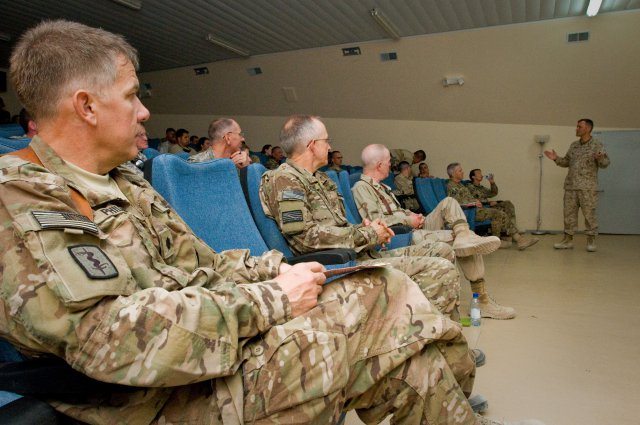Among all the injuries servicemembers sustain during a combat deployment, the most common are concussions, post-traumatic stress and other difficult to detect behavioral health issues.
In fact, studies show anywhere between 10 and 20 percent of deployed servicemembers will sustain a concussion, said Col. Jamie Grimes, theater neurologist for Task Force 44 Medical Brigade, the largest medical command in Afghanistan.
“If you think about the 1.6 million servicemembers who have already deployed, even 10 percent is a very large number, “said Grimes. “Without the right systems of detection in place they’re at greater risk of being sent back into the fight too early.”
Unfortunately, the most significant findings about battle injury treatments are not published until months or even years after a combat health professional returns from a deployment, said Navy Cmdr. Benjamin T. Griffeth, head of mental health for the Role 3 Multinational Medical Unit on Kandahar Airfield, Afghanistan.
Servicemembers are working to break this tradition. On June 24, 2011, nearly 100 military health care professionals from across Afghanistan met on KAF to discuss their cutting-edge findings and innovative techniques for behavioral health and concussion care. It was the first time in Afghanistan such an event occurred.
“This conference represents military medicine moving forward,” said Griffeth, a Navy reservist. “You’re seeing a multinational group meet, in real time, to discuss, ‘How can we do what we do better?’ It’s not, ‘What could we have done three years ago,’ it’s, ‘What are we going to start doing tomorrow for the Soldier serving right now?’”
One of the most innovative ideas discussed was the concept of psychotherapy teleconferencing, a video chat counseling session that works like Skype. With the new technology, Soldiers would be able to speak with a psychologist instantly from anywhere in the world.
Such a system has yet to be fully developed, but there are many military psychologists putting the idea to use and making this service available to servicemembers currently deployed in hostile areas.
The conference allowed experienced professionals to share ideas such as this, but even more so, the three-day event brought servicemembers from the rank of private first class to rear admiral together in the same room to discuss real cases from the combat zone.
“Just being here surrounded by all these professionals — I get to learn a lot,” said Pfc. Stephanie A. Lora-Surun, behavioral health specialist for Company C, 325th Brigade Support Battalion, 3rd Infantry Brigade Combat Team, 25th Infantry Division. “Bookwork is bookwork. I can read it, but getting told how to actually deal with a patient — it’s a huge benefit. Because I’m not seeing regular civilians from around the block, I’m seeing Soldiers with symptoms and problems related to war.”
Grimes said since the signs of a concussion or behavioral health issue are not always obvious, it’s these first-line Soldiers, Sailors, Airmen and Marines, like Lora-Surun, who will have the most influence when it comes to prevention and identification. The regular troop is more willing to listen to someone they know, rather than to a television commercial or a high-ranking stranger, and therefore they can get the help they need.
The entire conference was a huge growth experience for everyone involved, said Navy Rear Adm. David J. Smith, chief of the International Security Assistance Force, Combined, Joint Medical Branch.
“I think each person is going to take something different out of it,” said Smith. “We’ll go back and be that much more capable at keeping our most important asset, the war fighters, in the fight.”
The conference is scheduled to be an annual event.











